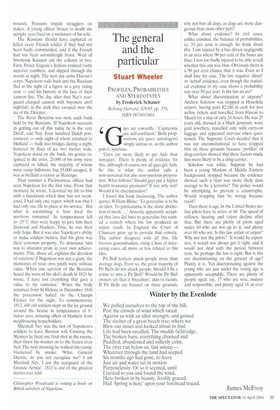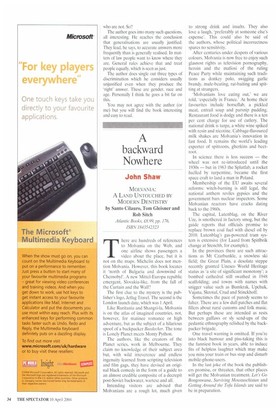The general and the particular
Stuart Wheeler
PROFILES, PROBABILITIES AND STEREOTYPES by Frederick Schauer Belknap Harvard, $29.95, pp. 359, ISBN 0674011864 G
‘ ays are cowardly.' Capricoms are self-confident.' Both propositions are (pace astrologers) simply untrue or, as the author puts it, spurious.
'Gays are more likely to get Aids than non-gays.' There is plenty of evidence for this, although of course not all gays get Aids. So this is what the author calls a non-universal but also non-spurious proposition. What follows? Should gays pay a higher health insurance premium? If not, why not? Would it be discrimination?
I found this book fascinating. The author quotes William Blake: 'To generalise is to be an idiot. To particularise is the alone distinction of merit ....' Aristotle apparently accepted that laws did have to generalise but wanted a remedy where the law produced an unjust result. In England the Court of Chancery grew up to provide that remedy. The author disagrees with all this. He favours generalisation, citing a host of interesting cases, all more or less related to this idea.
Pit Bull terriers attack people more than average dogs. Even so, the great majority of Pit Bulls do not attack people. Should it be a crime to own a Pit Bull? Would-he Pit Bull owners say that is 'breedism', akin to racism. If Pit Bulls are banned on these grounds, why not ban all dogs, as dogs are more dangerous than most other pets?
What about evidence? In civil cases, unlike criminal, the balance of probabilities, i.e. 51 per cent, is enough. So think about this. I am injured by a bus driven negligently in an area where 90 per cent of the buses are blue. I was too badly injured to be able to tell whether this one was blue. Obviously there is a 90 per cent chance that it was. Even so I shall lose my case. The law requires 'direct' or 'actual' evidence, even though the statistical evidence in my case shows a probability way over 50 per cent. Is the law an ass?
What about discrimination at airports? Andrew Sokolow was stopped at Honolulu airport, having paid $2,100 in cash for two airline tickets and travelled from Hawaii to Miami for a stay of only 24 hours. He was 25 years old, dressed in a black jumpsuit, wore gold jewellery, travelled only with carry-on luggage and appeared nervous when questioned. The Supreme Court decided that it was not unconstitutional to have stopped him on these grounds because 'profiles' of drug-carriers showed that these factors made him more likely to be a drug-carrier.
Sokolow was white. Suppose he had been a young Moslem of Middle Eastern background, stopped because the evidence showed such a man was more likely than average to be a terrorist? The police would be attempting to prevent a catastrophe. Would stopping him be wrong because racist?
Then there is age. In the United States airline pilots have to retire at 60. The speed of reflexes, hearing and vision decline after that. But there are plenty of pilots aged under 60 who are not up to it, and plenty over 60 who are. Is this law unfair or unjust? Why not test the pilots? It would be expensive, it would not always get it right, and it would not deal with the period between tests. So perhaps the law is right. But is this not discriminating on the ground of age? Plainly it is, Yet discriminating against the young who are just under the voting age is apparently acceptable. There are plenty of people aged, say, 17 who are wise, mature and responsible, and plenty aged 18 or over
who are not. So?
The author goes into many such questions, all interesting, He reaches the conclusion that generalisations are usually justified. They lead, he says, to accurate answers more frequently than is generally realised. In matters of law people want to know where they are. General rules achieve that and treat people equally, which is seen as just. The author does single out three types of discrimination which he considers usually unjustified even when they produce the 'right' answer. These are gender, race and age. Personally I think he goes a bit far on this.
You may not agree with the author (or me) but you will find the book interesting and easy to read.



































































 Previous page
Previous page